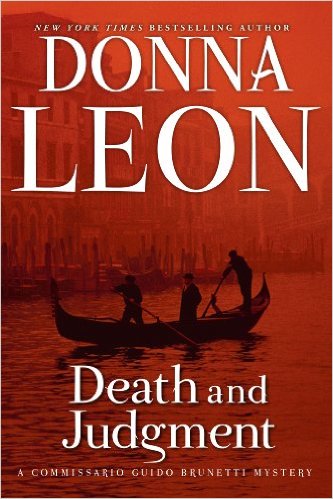
Though she has lived in Venice for more than a quarter-century, Donna Leon has insisted that the Commissario Brunetti series of detective novels she sets in Venice not be translated from English into Italian. There’s no mystery here. Leon’s picture of Italian society is merciless. In numerous ways, her novels are all about corruption in Italy.
In Death and Judgment, the fourth in her Commissario Brunetti series, Leon writes, “villains ruled the land. All, or what seemed like all, of the major political figures who had ruled the country since Brunetti was a child had been named in accusation, named again on different charges, and had even begun to name one another, and yet not one of them had been tried and sentenced, though the coffers of the state had been sucked dry.”
Again: Brunetti “often thought that the only safe procedure a person could undergo at the Ospedale Civile was an autopsy. It was the only time a patient ran no risk.”
Invariably, Brunetti is forced to work around the orders of his boss, Vice-Questore Patta, whose overriding concern is that the Commissario not jeopardize the favor he enjoys from the local elite. A typical admonition from Patta runs along these lines: “‘Brunetti, don’t go stirring up trouble with this.'”
Death and Judgment (Commissario Brunetti #4) by Donna Leon ★★★★☆
Despite Brunetti’s brilliant detective work, the end result of his investigations all too frequently is a cover-up, leaving the Commissario despondent. “Brunetti knew this mood and almost feared it, this recurring certainty of the futility of everything he did. Why bother to put the boy who broke into a house in jail when the man who stole billions from the health system is named ambassador to the country to which he had been sending the money for years?”
As the long-suffering Brunetti notes in a conversation with his secret collaborator, Vice-Questore Patta’s extremely competent secretary, “‘For fifty years, ever since the end of the war, all we’ve ever been is lied to. By the government, the church, the political parties, by industry and business and the military.’
“‘And the police?’ she asked.
“‘Yes,’ he agreed with no hesitation whatsoever, ‘and the police.'”
Is this an accurate picture of Italy today? I haven’t spent enough time in the country or traveled widely enough there to be able to answer the question. Perhaps it’s relevant that Death and Judgment, published in 1995, was only the fourth book in the now 25-strong Commissario Brunetti series. But, other than the switch from the lire to the euro, I suspect that things haven’t changed that much in Italy in the last 20 years. Certainly, the recurring news reports about Italy’s nonstop political game of musical chairs isn’t encouraging.
It may be no exaggeration to say that Death and Judgment, like the other novels I’ve read in the Commissario Brunetti series, is a work of social commentary as well as a murder mystery. Like many of her contemporaries, Donna Leon demonstrates a mastery of sociology as well as skill in crafting a suspenseful novel.
For more reading
You might also enjoy my posts:
- Top 10 mystery and thriller series
- 20 excellent standalone mysteries and thrillers
- 30 outstanding detective series from around the world
- Top 20 suspenseful detective novels
- Top 10 historical mysteries and thrillers
And you can always find my most popular reviews, and the most recent ones, on the Home Page.


























